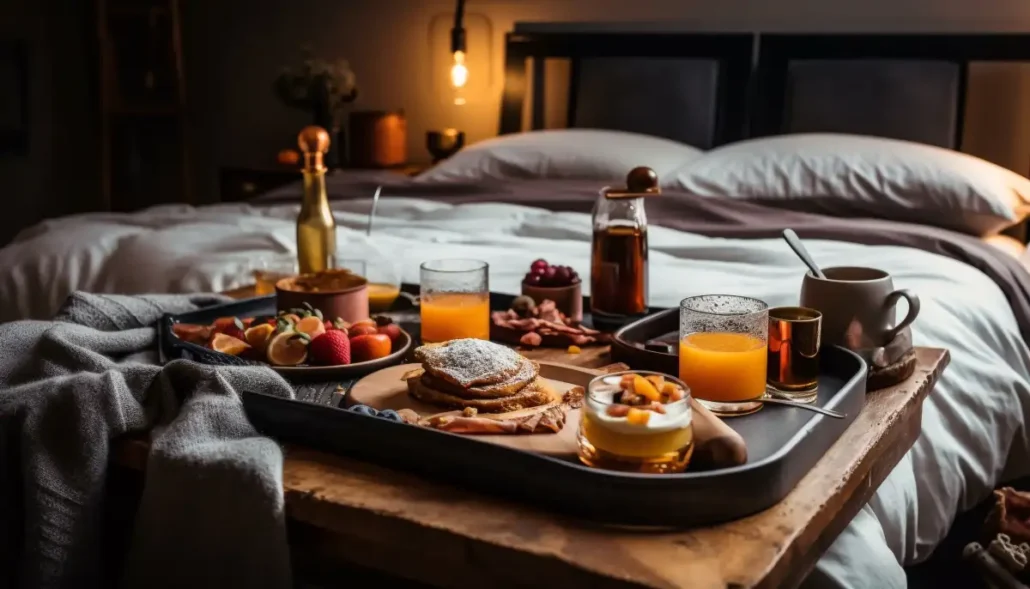Tired and Wired? Foods to Avoid Before Bedtime
Your Evening Eating Habits Could Be Affecting Your Sleep Quality
Are you struggling to get a good night’s sleep? You might be surprised to learn that your evening meals and/or snacks could be a major culprit. Recent research highlights a strong connection between diet and sleep quality, suggesting that what you eat before bedtime can significantly impact your rest.
From heavy, fatty foods to refined carbohydrates and sugary snacks, certain dietary choices can disrupt your sleep patterns, leaving you tired and wired the next day. By understanding and avoiding these foods, you can take control of your sleep and achieve the restful sleep you deserve.
The Science of Diet and Sleep
Recent studies show a correlation between diet and sleep quality. For example, nutritional epidemiologists at the University of Minnesota analyzed the sleep quality of people 18 and older in the U.S. in comparison to how closely they followed the Dietary Guidelines for Americans. The findings showed that people who did not consume an adequate amount of fruits, vegetables, legumes, and whole grains experienced shorter sleep duration.
On the other hand, a dietary intervention study conducted by the university’s research team among young adults aged 21 to 30 found that participants who increased their servings of fruits and vegetables over three months experienced better sleep quality and were less likely to report symptoms of insomnia.
Let’s take a look at the main dietary culprits of poor sleep.
Foods That Disrupt Sleep
Steer Clear of Heavy or Fatty Foods
It’s far better to skip a trip to your favorite fast food restaurant on the way home from a late night at the office or your child’s evening activities. The saturated fats found in fast food and fried foods, such as burgers, fries, and other processed foods, can lead to less deep sleep—the most restorative type of sleep.
Other high-fat foods can cause digestive issues and discomfort that keep you from falling asleep or wake you up during your slumber. Try your best to avoid the following foods in the evening:
- Ice Cream, creamy sauces, and certain cheeses
- Fatty cuts of red meat
- Snacks such as chips, cookies, and pastries
- Large evening meals
Avoid Refined Carbohydrates
White breads and pastas contain refined carbohydrates that your body metabolizes quickly. While a heaping bowl of spaghetti might be a family favorite at dinner time, you risk an increase in nighttime wakings due to hunger and triggering symptoms of insomnia.
In addition to white bread and pasta, avoid the following:
- Sugary cereals and drinks
- High card snack foods and sweets
- White rice
- Fruit juice
Pass on the Spice
Your favorite spicy foods also make the list of foods to avoid before going to bed. Spicy foods are typically highly acidic, which can interfere with digestion and cause acid reflux—a condition that occurs when stomach acid backs up into your esophagus. The burning sensation from acid reflux can keep you up until all hours of the night instead of sleeping comfortably.
Prevent heartburn from acid reflux by avoiding:
- Hot peppers
- Chili powder
- Salsa
- Tomato sauces
Additionally, curries, hot sauces, and mustards contain high levels of capsaicin, a chemical that can cause your body temperature to rise. Trying to get to sleep when you’re too hot can be extremely difficult and frustrating. All of these features of spicy foods require more energy for them to digest, which can prevent you from getting adequate deep sleep.
Say “No” to a Sugar Crash
Foods that are high in sugar are a big no-no before bedtime. Sweets can cause blood sugar to spike before your head hits the pillow and crash after you’ve fallen asleep. When this happens, your adrenals think you’re experiencing an emergency and begin producing more cortisol—the stress hormone. The last thing you want is to awaken from a comfortable slumber only to feel like you’re in fight or flight mode.
Many sweets are also high in saturated fat; thus, the duplication below:
- Candy
- Sugary cereals
- Cookies and cakes
- Soft drinks
- Sweetened beverages
- Dried fruit
- Fruit juice
Skip High-Protein Foods
While high-protein foods are a good choice for breakfast, lunch, or an afternoon snack, it’s best to avoid them in the evening to prevent digestive issues. High-protein foods take longer to break down, on top of the fact that your digestion slows by up to 50 percent while you sleep.
Be mindful of your dinner and evening snack choices to avoid these high-protein foods:
- Steak
- Chicken
- Aged or processed cheeses
- Salami
- Pepperoni
What About Alcohol and Caffeine?
It’s no secret that foods and beverages that contain caffeine or alcohol can disrupt sleep in several ways. While it might be tempting to have a soft drink at dinner, a cup of coffee with dessert, or a nightcap at the end of a long day, you’ll regret it when you’re tossing and turning during the night.
Caffeine consumption up to six hours before bedtime can block the hormone adenosine, which promotes sleepiness. Try to make your last trip to the coffee pot no later than mid-afternoon and opt for water in the evening.
Alcohol can have a sedative effect, making it easier to fall asleep initially. However, it can disrupt sleep patterns by decreasing the amount of time you spend in REM (rapid eye movement) sleep—when dreams occur—and cause an increase in night awakenings.
Late-night Eating Tips
You don’t have to avoid foods and beverages altogether—or even the ones mentioned in this guide—as long as you practice good sleep hygiene. This practice encourages you to be mindful of your daily habits, which will promote better rest and keep you refreshed and alert during the day. Essentially, good sleep hygiene focuses on establishing routines that incorporate healthy habits to improve sleep and avoiding activities that negatively impact sleep.
Try these tips for mindful eating when the last-night snack attack happens:
- Eliminate Distractions: Focus only on eating. Turn off your phone, computer, or TV, and take time to savor your last snack of the day.
- Listen to Your Body: Heading to the kitchen before bed can easily become a habit, as can grabbing a snack because you’re bored or stressed. Instead of reaching for an evening snack, try drinking a glass of water and waiting 20 minutes before eating. You may find that you weren’t hungry after all.
- Limit Portions: A snack is called a snack for a reason. Limit the portion size of your evening snack, and, again, wait 20 minutes before reaching for a second serving.
When to Seek Professional Help
Not only can eating before bed impact your sleep, but it can also adversely affect your overall health and well-being. Late-night snacks several times a week can pack on extra calories in a hurry, leading to:
- Weight gain
- Increased risk of diabetes
- Hypertension (high blood pressure)
- Heart disease
- Certain cancers
Consider working with a dietician to evaluate your current diet and develop a personalized plan that emphasizes adequate nutrition. Consistent nutrition, starting with breakfast, provides the energy you need to stay productive and focused, allowing you to sleep better at night—without feeling hungry.
Stress and anxiety can also lead to late-night snacking. Reach out to a healthcare professional if you need help managing your emotions.
Check Out These Blogs on Diet and Sleep!
- The Sleep-Diet Connection: How Your Meals Impact Your Zzzz’s
- The Link Between Diet and Sleep: Foods That Promote Better Rest
- The Sleep Diet
And Our YouTube Channel!



